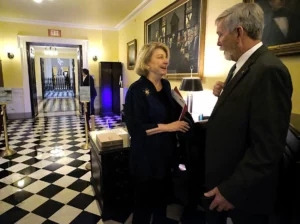
by Dick Hall-Sizemore
The Richmond Times-Dispatch reports there is an agreement on the state budget. There have been hints in the news about it all week, with the General Assembly announcing that it would come back to Richmond June 1 to take up various measures. All the details will not be available until late Sunday or Monday, but the chairs of the two money committees have released the highlights.
I will defer to our tax expert, Steve Haner, to discuss the revenue aspects of the deal. It looks to be the compromise that he has said was on the table all along—some increase in the standard deduction (but not entirely what the Governor proposed) along with a refundable tax credit.
I want to focus on one surprise in the package that represents two major changes in state policy. The proposed deal includes $320 million in general fund appropriations this year and an additional $150 million in the future, contingent on revenue, to help fund the expansion of the “I-64 gap” between Bottoms Bridge near the Henrico/New Kent border and James City County. This is the project I wrote about earlier and, surprisingly to me, engendered a lot of comments.
The first major policy change is the use of general fund appropriation for a major highway project. Generally, the policy has been for highways to be funded through user fees and taxes, i.e. gasoline taxes and motor vehicle purchase, registration, and license fees and taxes. There is a precedent, however, for using general fund revenue for highway construction. Since 2008, one-third of the annual revenue from the annual tax on insurance companies has been washed through the Commonwealth Transportation Fund to pay the debt service on the bonds used to finance the widening of Route 58 across the southern boundary of the Commonwealth.
(I seem to remember that the Route 58 bond program was authorized in the late 1980’s and, in a deal engineered by the late, legendary delegate, A.L. Philpott of Henry County, the debt service on the bonds would be paid out of the general fund in return for his agreeing to allow Northern Virginia localities to increase their recordation taxes to be used for a regional transportation program. However, the on-line documents do not go back that far; therefore I cannot readily confirm my memory. The rationale for the 2008 change was probably a desire to tie the debt service more closely to transportation since a significant portion of the insurance license tax revenue comes from motor vehicle insurance policy revenue.)
Secondly, this appropriation is a departure from the Commonwealth’s decision to base road construction funding on objective factors, rather than political ones. VDOT describes its Smart Scale program as “a process that helps Virginia meet its most critical transportation needs using limited tax dollars. It evaluates potential transportation projects based on key factors like how they improve safety, reduce congestion, increase accessibility, contribute to economic development, promote efficient land use, and affect the environment.” As reported earlier, the expansion of I-64 to six lanes along this stretch does not qualify for funding under the Smart Scale criteria. However, there is obviously a lot of political support for the project. The Smart Scale program was instituted in 2015 as a way of taking politics out of highway projects. It didn’t take long for politics to get back in.
By the way, I drove to Virginia Beach one morning a couple of weeks ago along I-64. Despite the many comments to my blog post about the congestion on this road, I had to ease up on cruise control only a couple of times before I got to Newport News. I have driven to Northern Virginia at the same time of day. There is no comparison. I acknowledge that I-64 is a mess on weekends during the summer months, but I question the priority of spending billions to relieve seasonal traffic.
Finally, it appears that I was wrong in my prediction that the Senate would wait to see what the Governor did with the bills it sent back after rejecting his recommended amendments. Nevertheless, midnight tonight is the deadline for the Governor to act, so there is still time for things to go awry. However, I suspect that there has been enough communication going back and forth in back channels that everyone is comfortable.

Leave a Reply
You must be logged in to post a comment.